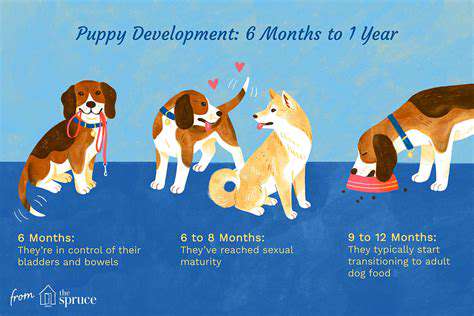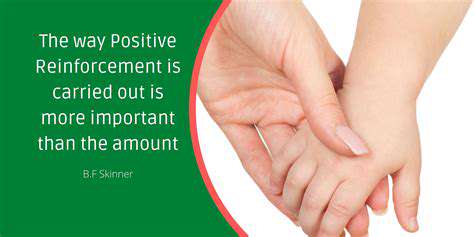Involving the Whole Family in Puppy Socialization
The Importance of Early Socialization for Your Puppy
Early Exposure to Different Environments
Puppy socialization is crucial for shaping a well-adjusted and confident dog. Early exposure to various environments, sounds, sights, and smells is vital for preventing fear-based behaviors later on. This means taking your puppy to different parks, bustling streets (with appropriate supervision), and even the local dog park, all in a controlled and positive manner. Gradually introducing new stimuli helps your puppy develop coping mechanisms and resilience, leading to a happier and more adaptable companion in the long run. It's important to note that introducing new stimuli should always be done in a positive and controlled way, ensuring the puppy is not overwhelmed or frightened.
Exposing your puppy to different types of surfaces, such as grass, pavement, and sand, is also part of this crucial stage. This variety of textures helps your puppy develop a broader understanding of their surroundings and builds confidence in navigating diverse environments. Remember, consistency is key. Regular exposure to varied stimuli is more effective than sporadic encounters.
Introducing Your Puppy to Other Dogs and People
Early socialization also involves introducing your puppy to other dogs and people in a safe and controlled environment. This helps them understand appropriate canine and human interactions, building positive associations. Arrange playdates with friendly, well-socialized puppies and dogs, always ensuring the interactions are supervised. This allows your puppy to learn appropriate play behaviors and how to interact respectfully. Remember, it's better to have a short, positive interaction than a long, negative one. Early exposure to diverse individuals, including children and adults, is equally important.
When introducing your puppy to new people, ensure they are calm and patient, allowing the puppy to approach them at their own pace. Avoid rushing the process or forcing interactions. Positive reinforcement, such as treats and praise, can encourage a positive association with new people. This helps your puppy develop confidence in interacting with different people and builds a foundation for friendly and appropriate social behavior.
The Role of Positive Reinforcement in Shaping Behavior
Positive reinforcement plays a vital role in the socialization process. Rewarding calm and appropriate interactions with treats, praise, and affection helps your puppy associate positive experiences with new people, animals, and environments. This encourages them to approach new situations with confidence and enthusiasm. Consistency in positive reinforcement is key to shaping a well-adjusted adult dog. Avoid punishment, which can lead to fear and anxiety, and focus on rewarding desired behaviors instead.
By using positive reinforcement techniques, you're not only shaping your puppy's behavior but also fostering a strong bond with them. This positive association makes learning new things more enjoyable for your furry friend, and builds a positive and trusting relationship.
Consistency and Patience in Socialization
Socialization isn't a one-time event; it's an ongoing process that requires consistent effort and patience. Regular exposure to various stimuli, people, and animals is essential for your puppy's development. Making it a routine part of your puppy's daily life, rather than a sporadic activity, will yield the best results. Be mindful of your puppy's body language and cues. If your puppy shows signs of stress or anxiety, remove them from the situation and try again later. Patience is key; progress may not always be immediate, but consistent effort will pay off.
Remember, every puppy is different, and some may require more time and support than others. Be understanding and supportive, and always prioritize your puppy's well-being. By providing a consistent and positive socialization experience, you're laying the groundwork for a happy, healthy, and well-adjusted adult dog.

Long-Term Benefits of Family-Based Puppy Socialization

Long-Term Emotional Growth
Family-based approaches to care and support foster a strong sense of belonging and security, which are crucial for a child's emotional development. These supportive environments allow children to build healthy attachments and develop a positive self-image. This foundation is essential for navigating the complexities of adolescence and adulthood, promoting emotional resilience and coping mechanisms.
Enhanced Communication Skills
Families often provide a dynamic environment for children to practice and refine their communication skills. Engaging in meaningful conversations, resolving conflicts, and expressing emotions within a family setting equip children with crucial interpersonal skills applicable in various social contexts throughout their lives. These skills are vital for building strong relationships and navigating the social world effectively.
Improved Academic Performance
Family involvement in a child's education has a direct impact on their academic success. Parents who actively participate in their child's learning, providing encouragement and support, often see improved grades and a greater enthusiasm for learning. A strong family foundation can provide the necessary encouragement and structure to help children achieve their full academic potential. This can translate to better future opportunities and personal growth.
Stronger Social Networks
Family-based care often expands a child's social network, exposing them to a wider range of perspectives and experiences. This expanded network can be invaluable for building connections and friendships throughout their lives. The support systems created within families can contribute to a child's overall well-being and social development.
Development of Problem-Solving Abilities
Working through family challenges, whether big or small, fosters a child's problem-solving skills. Navigating conflicts and disagreements within a family unit teaches children how to approach problems constructively and find solutions collaboratively. This crucial life skill is applicable to various aspects of their lives, from personal relationships to professional endeavors.
Positive Behavioral Patterns
Children often model the behaviors they see in their families. A family that prioritizes healthy habits, respect, and empathy creates a supportive environment conducive to a child's positive development. This positive modeling can influence a child's attitude and behavior in various situations, shaping their outlook on life and their interactions with others.
Reduced Risk of Negative Behaviors
Family-based support systems can significantly reduce the risk of children developing negative behaviors. The consistent and loving environment offered by family often serves as a protective factor against risky behaviors and negative influences. Strong family bonds can provide a buffer against peer pressure and other environmental stressors, promoting a positive trajectory for the child's future development.
Read more about Involving the Whole Family in Puppy Socialization
Hot Recommendations
- The Impact of Early Socialization on a Dog's Interaction with Other Animals
- Car Travel and Puppy Socialization: Making the Journey a Positive Experience
- The Importance of Early Environmental Exposure for Puppy Development
- Taking Your Puppy to the Vet: Positive Socialization Strategies
- Making Training a Positive Experience for Your Puppy
- Public Transportation and Puppy Socialization: A Step by Step Guide
- Safe Socialization: Allowing Others to Pet Your Puppy
- Helping a Puppy Who Struggles with "Stay"
- Positive Puppy Interactions: Making Meetings with New Friends Fun
- No Treats Needed? Training Basic Commands with Verbal Praise











